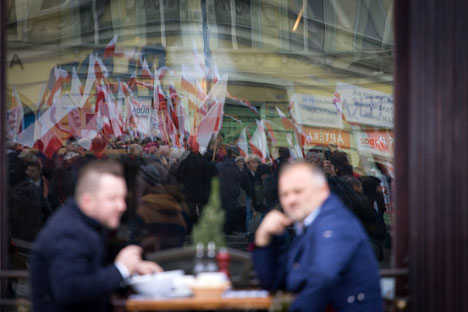“What is specific to Poland is that the past eight years have apparently created a pronounced case of cognitive dissonance”, wrote Jacek Rostowski on 26 October 2015, the day after the right-wing Law and Justice party (PiS) won a sweeping electoral victory following eight years in opposition. During those eight years, Civic Platform (PO) was in power and Poland enjoyed stable GDP growth averaging 3.2 per cent and the real per capita income of the middle three quintiles of the population increased by 28 per cent. Therefore, according to Rostowski – who served as Poland’s minister of finance between 2007 and 2013 –, the fact that the majority of Poles voted for the party that consistently claimed the country was ruined could only be attributed to a serious failure of communication on the part of the previous government.

Outdoor diners observe a scene repeated throughout Poland in December 2015, as pro-government demonstrators gather on one side of the Old Town Market Square in the city of Bydgoszcz, and pro-democracy demonstrators on the other. Photo: Jaap Arriens. Source: Flickr
Events in Poland
Tens of thousands of nationalist demonstrators marched though Warsaw on Saturday, 11 November 2017, in what observers say was one of the biggest gathering of far-right activists in Europe in recent years.
Why Poland? And why now?
Eurozine presents the following texts from recent years that explore the political and social context in Poland.
The legacy of communism is not an adequate explanation to the rise of the right there, says Pawel Marczewski.
Across Europe, and especially in Hungary and Poland, parliamentary politics has become increasingly intertwined with the politics of street protest, writes Mateusz Falkowski.
Meanwhile, one of Poland’s leading writers and critics, Andrzej Stasiuk, explores what drove him to realize a lifelong dream, and strike out ever further eastwards, away from his childhood home.
Rostowski’s diagnosis is broadly shared not only among the members of the defeated PO, but also by many Polish commentators and analysts. “People just felt the need to protest a little bit”, one leading specialist in electoral studies told me in a private conversation. But blaming electoral defeat of the liberal political party, which managed to keep the country’s economy afloat during the international economic crisis, solely on the government’s inability to connect with the general public appears extremely short-sighted, if we take into consideration what appears to be an emerging trend among East-Central European members of the European Union: namely diverging from the European mainstream in issues such as the primacy of the rule of law over national interests or the necessity of common European immigration policies. By refusing to seriously consider the possibility that Poles did not fail to realize that their country is enjoying relative economic success, but actually wanted a government that would be more eurosceptic and critical of the idea of liberal democracy, one misses the wider context in which recent Polish elections are situated.
Which consensus?
James Dawson and Seán Hanley, in their essay subtitled “The fading mirage of the ‘liberal consensus'”, certainly avoid the mistake of tunnel vision, offering instead an overview of the lack of democratic consolidation in East-Central Europe as a whole. The discussion about democratic backsliding in East-Central Europe is misguided, argue Dawson and Hanley, because it rests on the false premise that democracy was at some point at least modestly consolidated in the region. According to them, this was never the case, because what they call “a liberal consensus” and consider a prerequisite for a sustainable democracy was never actually achieved by East-Central European societies. “Despite the presence of many self-proclaimed liberals in mainstream politics, no such political-cultural project was ever attempted on a scale sufficient to embed liberal norms and practices in contexts where they had previously been missing. Far from backsliding on limited earlier progress, East-Central Europe’s democratic consolidation is better viewed as having always been somewhat illusory”, write Dawson and Hanley.
Their diagnosis serves well as a much needed wake-up call to all those who, like the former Polish minister of finance, believe that the ousting of a formally liberal party in Poland was first and foremost a result of its inability to communicate with a broader electorate and failure to convincingly present its economic achievements. In fact, Rostowski’s reaction to the election results provides a perfect validation for Dawson and Hanley’s evaluation of the state of liberalism in the country. “Poland’s status as a champion of liberalism – or bulwark against illiberalism – may owe more to its party-electoral configuration than to any deep cultural embrace of liberal norms. Like many pro-market liberal parties in the region, PO pursues a narrowly defined technocratic program that is economically liberal but socially conservative”, they observe. By using the term “cognitive dissonance” to explain why the economic achievements of PO governments did not translate into reelection, Rostowski indirectly confirms the party’s allegiance to “a narrowly defined technocratic program”.
Dawson and Hanley’s thesis about the mirage of the “liberal consensus” might support a critique of the superficial and technocratic liberalism of regional political elites, but it fails to convincingly capture deeper societal dynamics. This shortcoming results from the contested meaning of the term “liberal consensus” itself.
Ivan Krastev already pointed to a significant contradiction in his response to the authors: “Does liberal democracy mean the acceptance of certain liberal constraints on the democratic majority, or does it mean a society dominated by what the authors call ‘progressive liberalism’? Indians insist that their version of secularism is a framework for the interaction among different religious communities, one that does not assume the existence of mostly nonreligious people […]. In a similar way, could we not think about liberal constitutionalism as a framework that does not necessarily assume the hegemonic role of liberal actors?” In other words, should “liberal consensus” be limited to certain unquestionable rules of the game that are accepted by all political actors, or does it have to contain a certain ideological core? Dawson and Hanley seem to argue for the latter, but they fail to explain why only liberalism understood as a strong dedication to certain progressive values on the part of political actors can lead to truly significant democratic consolidation in East-Central Europe. After all, many democracies in western Europe and elsewhere were built on a minimal version of the “liberal consensus” understood as a set of rules and laws rather than values.
Moreover, even if we agree with the authors that democratic consolidation is in the longer run impossible without strong political actors dedicated to progressive liberalism, it is not clear as to precisely which values constitute the “liberal consensus” and whether these values do not in fact contradict each other when they become tools for the political mobilization of certain social groups. Dawson and Hanley make a passing, general remark about the treatment of the Roma population and LGBT rights as “touchstone social issues” that East-Central Europe political systems fail to acknowledge. When discussing the case of Bulgaria, which they regard as offering a model for illusory “liberal consensus” in the region, they criticize the protest movement that broke out in June 2013 “for neglecting and often seeking to delegitimize the interests of disadvantaged sections of society.” One can therefore infer that what they mean by “liberal consensus” is a combination of progressive economic policies and dedication to social inclusion and the recognition of different minority groups. They seem to overlook the fact that demands for greater economic equality in many democracies, not only in East-Central Europe, do not necessarily go hand in hand with speaking up for the rights of ethnic or sexual minorities. Intersectionality is a postulate that appeared relatively late in democratic social movements and is still far from being fulfilled in East-Central Europe and elsewhere. Therefore to make it a prerequisite for liberal consensus results in turning democratic consolidation into an elusive, never-ending task.
Filling the “hollow core”
Dawson and Hanley’s thesis about the necessity of genuinely promoting the consensus of liberal values rests on a premise borrowed from Dorothee Bohle and Béla Greskovits’s Capitalist Diversity on Europe’s Periphery. Bohle and Greskovits state that East-Central Europe democracies had a “hollow core” at their inception – preference was given to general economic effectiveness over mass civic and political engagement. This followed David Ost offering a similar insight regarding the Polish case in his Defeat of Solidarity: Anger and Politics in Postcommunist Europe. Ost, however, had already gone one step further when it came to the political void unintentionally created by former dissident elites aligning themselves with pro-market technocrats (the very issue that Dawson and Hanley cover when writing about “incestuous relations between political and economic elites”) and pacifying or ridiculing legitimate social protests. This political void was in fact being filled, argued Ost, with a mix of nationalism and vague promises of social justice coming from the Right, mainly from PiS.
Paradoxically, the label “hollow core” might best be applied to the period between 1989 and 2004, when all important political forces accepted a certain minimalistic version of “liberal consensus”, according to which NATO and EU accession was the main political goal. At the same time, populism became a very broad category, which served to delegitimize all political claims that might undermine or hamper this consensus and endanger the prospect of accession to organizations regarded as crucial for national security and economic prosperity. Probably some of the actors were not liberal in the sense that Dawson and Hanley ascribe to the term, but others – like Adam Michnik or Bronislaw Geremek – certainly were. They decided to support the minimalistic “liberal consensus” not because they did not believe in progressive values, but because they wanted East-Central European countries to be regarded as stable partners for western democracies. Their calculations were probably utterly justified at that time, even though they led to great amounts of unventilated social anger amassing domestically. Right after 1989, Poland, Hungary, and Czechoslovakia were praised for their peaceful regime changes. Such praise became even more frequent after the outbreak of the Yugoslav wars and is still heard among scholars assessing the achievements of East-Central Europe against the benchmark of some less affluent and politically stable post-Soviet countries.
I would therefore suggest that Polish political elites’ lack of strong engagement for progressive liberalism was not a product of insufficient civic spirit, but a deliberate strategic political choice, dictated partially by expectations of consolidated western democracies. But as soon as the main goals of this minimalistic “liberal consensus” were achieved and Poland enjoyed NATO and EU membership, suppressed political claims were openly expressed on the domestic political scene and brought PiS its first electoral victory in 2005. This is exactly the moment that Ivan Krastev accurately called the “strange death of the liberal consensus” in his article of 2007, which Dawson and Hanley quote from extensively. The liberal consensus has indeed died in East-Central Europe, but it was not only very different from the one envisaged by proponents of progressive liberalism, it was also adopted for very different reasons than the ones they assumed to be at play.
Contrary to what Dawson and Hanley argue, as soon as there was no longer any need for liberal consensus, the hollow core could be filled with mass civic engagement and political demonstrations. The problem is that the demands and values expressed by participating citizens did not necessarily accord with progressive liberalism. The largest social movement, at least in terms of sheer numbers, that Poland witnessed since the first Solidarity movement of the early 1980s, broke out in 2012 and was directed against signing the Anti-Counterfeiting Trade Agreement (ACTA). The recently re-elected PO government apparently did not expect such a backlash and, after some clumsy attempts to negotiate with the protesters, decided to back out from the agreement. On the surface, the anti-ACTA movement was a dream-come-true for a proponent of progressive liberal consensus – masses of civically minded activists organized themselves to strike down a free-trade and copyright agreement which was signed behind closed doors and perceived as mostly serving the interests of transatlantic business and political elites. However, a closer look reveals that behind the facade of the Guy Fawkes’ mask were not only civic engagement, but also conspiracy theories and outright nationalism. When interviewed by a team of sociologists working on a report about the protests, the young protesters were found to be highly suspicious not only of official political institutions (low levels of trust in political parties is almost universal in consolidated democracies too), but also of media or artists, accused by the protestors of defending their own parochial interests. Moreover, despite the general reluctance of protesters to make any political statements, protests were attended by radical right-wing groups like National-Radical Camp (ONR) or National Movement (RN).
In the light of these findings one has to discard worn-out explanations that declare the recent PiS electoral victory to be rooted in the undemocratic legacy of the communist regime and seriously take into consideration the fact that more than 60 per cent of voters in the age group 19-29 voted for right-wing and extreme right-wing parties. The oldest among these voters were born in 1986 and grew up after the fall of the Iron Curtain. Their parents and older siblings have first-hand experience of living under an undemocratic regime, but they don’t. Theirs is the burning feeling of being unrepresented politically and marginalized economically. In 2007, when the PO achieved its first major victory over PiS, the PO’s viral electoral campaign centered on the slogan “Take your grandmother’s ID”. Yet by 2015, grandchildren seemed to be much closer in their electoral preferences to their grandparents than to their parents or older siblings.
Electoral studies tend to disregard the youngest voters. It is often argued that their political preferences are unstable, and change as soon as youths enter the job market, have families and take on debt. But PiS would probably not be in power, were it not for the peculiar intergenerational alliance between age groups who grew up before and after 1989. If these young voters are indeed as suspicious of the authorities as they are attracted to nationalist ideas, one has to question whether the serious commitment of political elites to the cause of progressive liberalism was ever going to create any substantial resonance among them.
More importantly, the turn of young Poles to more radical politics may be part of a larger, international trend. Joseph Stiglitz observed recently: “Something interesting has emerged in voting patterns on both sides of the Atlantic: young people are voting in ways that are markedly different from their elders. A great divide appears to have opened up, based not so much on income, education, or gender as on the voters’ generation. There are good reasons for this divide. The lives of both old and young, as they are now lived, are different. Their pasts are different, and so are their prospects.” He adds that these prospects are shaped by three realities – social injustice on an unprecedented scale, massive inequities, and a loss of trust in elites. Seen from this perspective, the political choices of young Poles are not a product of a specifically East-Central European failure to produce a lasting liberal consensus, but a warning sign for all democracies across the globe.







